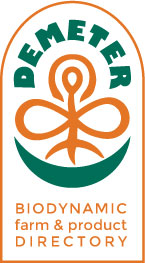“Healing people and the planet through agriculture”
For Farmers
Salmon-Safe and Demeter: A Farmer Inspired Collaboration
By Dan Kent, Executive Director, Salmon Safe
Working with vineyards and farms across the salmon watersheds of the Pacific Northwest over the last fifteen years, we see a lot of farming methodologies in action. Walking these Salmon-Safe farms over the years, we witness land transformed. Streamside restoration, re-establishment of native vegetation and hedgerows, changing cropping systems to minimize irrigation water use, and cover crops to control erosion all establish a more productive farming system where wild nature–including native salmon–can thrive.
As we survey this West Coast farmscape that we call "salmon nation," some of the most ecologically functional farms we see are Biodynamic, those farms already aligned with Salmon-Safe principles related to exceptional watershed stewardship and the integration of on-farm native habitat. That makes sense given that Demeter’s vision is to ‘heal our planet through agriculture.’ Here in Oregon, these farms include longtime Salmon-Safe vineyards that also have been leaders in Demeter certification. These winegrowers, including Cooper Mountain and Brick House, kept asking us, "how about joining forces with Demeter?"
Founded by river and native fish protection organization Pacific Rivers Council, Salmon-Safe was one of the first regional eco-labels in the late nineties, primarily certifying vineyard management on steep slopes above Oregon’s Willamette River. Now Salmon-Safe is an independent environmental nonprofit working across agricultural and urban land management from British Columbia through northern California. Salmon-Safe works with organic farmers as well as growers using rigorous integrated pest management. Either way, Salmon-Safe works to inspire techniques that restore sensitive habitats including streams and wetlands, promote irrigation water conservation, enhance biodiversity, and reduce runoff.
Inspired by Oregon winegrowers interested in seeing us work together, we finally sat down with Demeter a few years ago to compare the Salmon-Safe certification program with the U.S. Biodynamic Farm Standard. We realized there were opportunities to strengthen the Farm Standard in ways that would be even more protective of water quality and habitat.
Over the next two years we worked with Demeter, especially focused on the Farm Standard’s principle of Water and Waterway Conservation, to include additional riparian area management and irrigation water use requirements that were either not covered, or were covered only indirectly, under Biodynamic certification. Water conservation issues are paramount to a Biodynamic farm’s management, and are especially compelling given the severe drought the West Coast now faces. The enhanced Biodynamic Farm Standard was unveiled in September at the National Heirloom Expo in Santa Rosa, California.
In addition to providing improved water conservation guidance to Biodynamic farmers , West Coast Biodynamic growers within the range of wild Pacific salmon now have the ability to use the Salmon-Safe logo in sales and marketing. And there’s no cost for logo use. If your vineyard or farm is located in northern California, Oregon, Washington, or Idaho, you have full use of the Salmon-Safe brand in packaging and promotion. Just contact us at biodynamic@salmonsafe.org for more information.
Download Salmon Safe/Demeter Infographic
Download Salmon Safe/Demeter Postcard
"As we survey this West Coast farmscape that we call "salmon nation," some of the most ecologically functional farms we see are Biodynamic, those farms already aligned with Salmon-Safe principles related to exceptional watershed stewardship and the integration of on-farm native habitat."
Dan Kent
Executive Director Salmon Safe
Previous Articles






